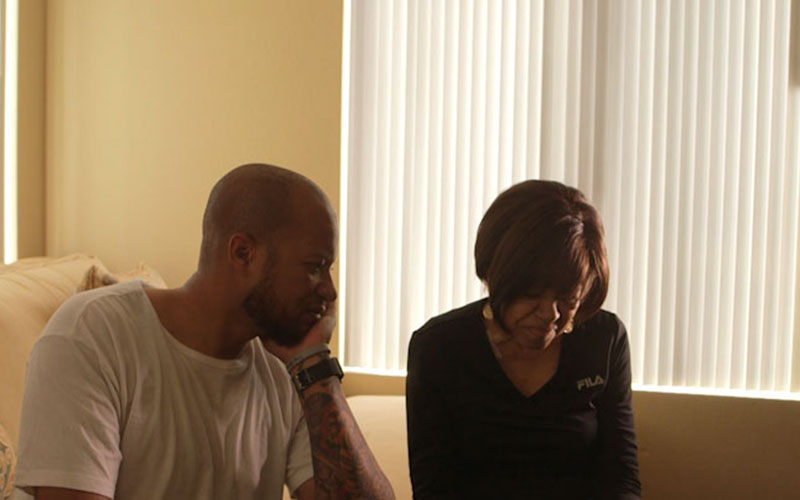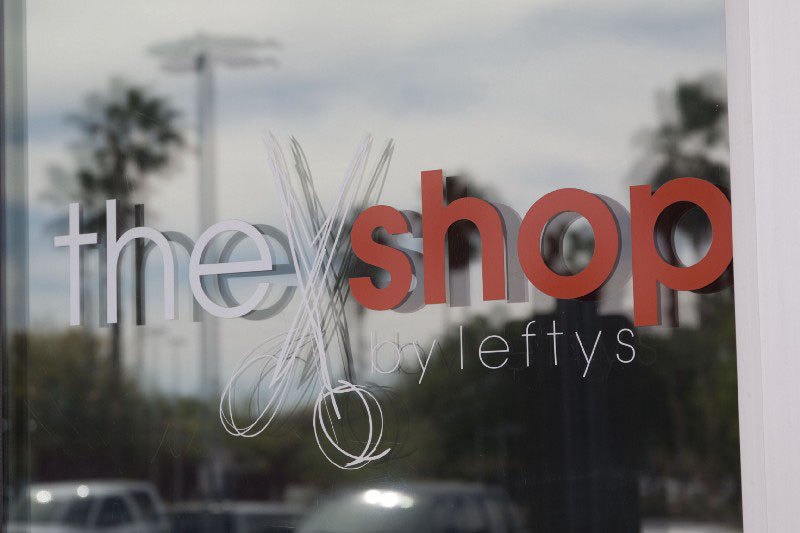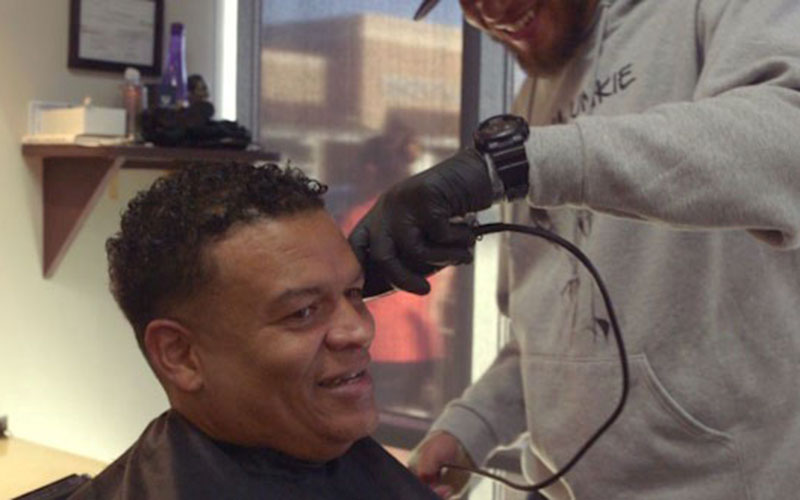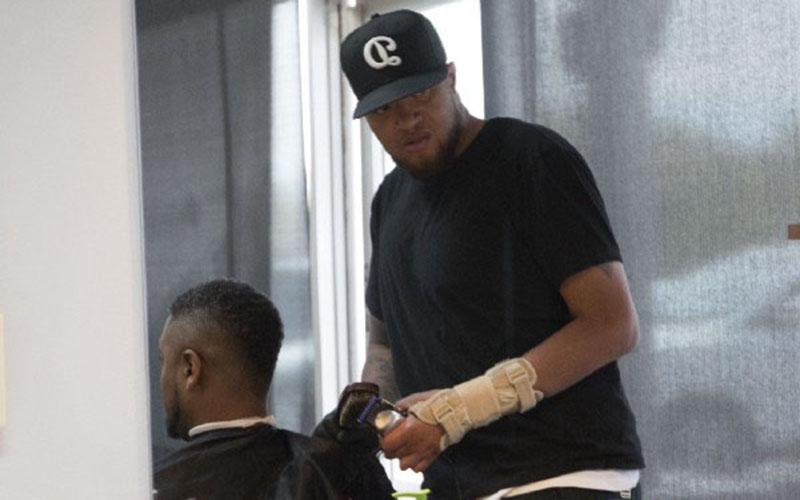Dwayne Phelps remembers white sheets, sterile walls and white-hot pain. He stared at blinding lights and watched as the doctors walked out of his hospital room.
They told him he’d never use his right arm again, and he became overwhelmed by guilt.
Phelps had been in a severe motorcycle accident — and he knew it was his fault.
In the coming months, Phelps would lose his job as a barber, abandon his dream of opening a shop, drop out of school, leave his fraternity and move back in with his mother. He faced hundreds of thousands of dollars in hospital bills.
“I just didn’t know what I was going to do,” Phelps said.
Depression set in, and the only thing that brought him out, he said, was his family and a group of brothers who weren’t related by blood. But they might as well have been.
To Phelps, the Kappa Alpha Psi fraternity has shaped the business man he is more so than anything else in his life. To many, fraternities can house preconceived stereotypes of young men who like to drink and party. But many are much more.
Within the African American community, fraternities often create a space for networking, mentorship and social and economic mobility.
“Being an African American man in college, there were so few positive groups that were geared toward creating a sense of community and acceptance for people of color,” Phelps said. “Black fraternities have a long history of promoting achievement and brotherhood amongst black men, and that was a history I wanted to be a part of and a community I am still proud to be a part of today.”
Through Kappa Alpha Psi, Phelps found encouragement, brothers who would later raise money to pay off his hospital bills and a mentor who would not quit until Phelps got his job back.
It was Gary Rosser who saw something missing in his friend and one day showed up at Phelps’ home in need of a haircut.
“You’re going to cut my hair with your left hand today,” he said.
Their bond began years earlier over basketball and tennis shoes. Rosser met Phelps back in 1997. Phelps was working at his first-ever job as a barber at Momo’s barber shop, now Ageez.
“It was an instant spark of brotherhood between Gary Rosser and I,” Phelps said.
Without the fraternity, Phelps said he wouldn’t have gotten his barber certification or applied for college. He said the fraternity was his life.
His brothers saved him, nurtured a dream that was almost abandoned — and ironically were involved in the accident that almost killed him.
Racing Toward Tragedy
From Right-Hand Man to a Boss Named Lefty from Kristina Vicario on Vimeo.
The weather was beautiful on Feb. 3, 2001.
Phelps had just purchased a brand new racing motorcycle that he said “was built for speed.” The bike was painted , red and white, to match his fraternity’s colors. This night,
he showed it off to his brothers for the first time.
“Let’s race,” one brother said.
Phelps knew better, but couldn’t resist.
As a young man, Phelps would have poured adrenaline over his Wheaties if he could. He knew youth and speed were a dangerous combination, deadly even; but in the moment, his
hands clammed up with excitement.
The group pulled up to a long stretch of bare road, revved their engines and roared down the street. It took 90 seconds for Phelps to reach the curve in the road. He was running out of room.
He decided to bail and thought the worst he would do was roll. But he slammed, arm first, into a real estate sign, the only one on the street.
He lay there shaking. His arm was numb and limp.
“Thank God I still have my life,” he remembered thinking.
Phelps didn’t truly know how bad the accident was until he saw his mother run through the ER doors. Doctors were cutting his off clothes and shoving him releases to sign.
“God, it was just the worst thing in the world,” Nanette Johnnie, Phelps’ mother said. “He never wanted to disappoint me or let me think anything bad about him… I was just traumatic about the whole thing.”
Phelps said he couldn’t bear the guilt. He told his mother he never should have gotten the motorcycle.
“I just lost it, I started breaking down,” Phelps said.
Call Me ‘Lefty’
For six months, his friends at Ageez stared at a vacant chair.
“I lost my arguing partner. I lost my right-hand man. I lost my partner in crime,” said Anthony Gathers, the shop’s owner and another of Phelps’ mentors. “I was devastated … I
was devastated.”
But what suffered more than anything was Phelps’ mindset. He had broken his humerus, broken his radius, split his bicep, suffered nerve and artery damage down his entire right arm — but still, all he wanted to do was give someone a haircut.
“I was very depressed,” Phelps said. “It took me a while to realize that life was still here. It was a tough moment.”
That was until Rosser showed up with hair that was slightly too long and a willingness to walk around for weeks with an uneven haircut.
Despite a lot of reluctance, Phelps pulled out the hair clippers he wrapped up after the accident six months earlier.
Then the right-handed Phelps cut Rosser’s hair — using his left hand.
“I started crying if I can remember right,” Phelps said. “I just didn’t think it would ever happen, and even in the midst of me doing it I couldn’t believe it was happening. It
was a spiritual, emotional and mental breakthrough. It really pushed the essence of who I am to come out.”
Rosser brought Phelps back to Ageez where he cut Gathers’ hair. Phelps went back to work the next day.
The only thing that changed, was Phelps’ brand. He paid $600 to canvas the city in 5,000 flyers to gain his clientele back. They were reluctant to give a barber who had lost the use of his dominant hand a chance again.
Only this time, he would function under a new name.
“I was like, just call me Lefty!” Phelps said. “So it was funny because after that more people started knowing me as Lefty than they knew me as Dwayne.”
Remember the Name
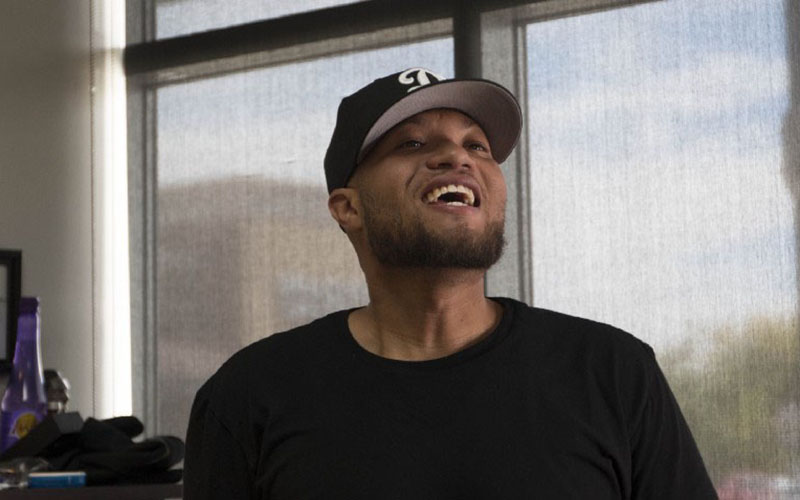
Dwayne Phelps laughs along with his barbers as they debate the best rookies in the NBA on April 6, 2017. (Photo by Kristina Vicario/Cronkite News)
Fifteen years later Lefty walks down an open road. He thinks he can still see the tire marks where his bike skid across the pavement.
“I have never got out and walked around here since it happened,” he said.
Nine miles east of this spot, stands a huge barber shop, decorated wall-to-wall with posters of famous basketball players, echoing with the chatter of 13 barbers and stylists.
It’s called, The Shop, by Lefty’s.
“Five years ago in January, I opened the shop, and it’s just been thriving,” Lefty said. “I just had to get out there and experience life. If you want to grow, you got to move on.”
The sun beats down on Lefty’s head. He looks up at it, and for a second, everything is white. But this time, he can’t feel the pain.
